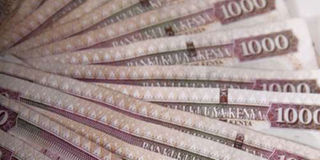Time runs out for those holding Sh1,000 currency notes

Kenyan Sh1000 currency bank notes. PHOTO | FILE | NATION MEDIA GROUP.
What you need to know:
- While the CBK deadline for using the old Sh1,000 notes is September 30, businesses argue they need enough time to exchange them.
According Kiarie, it is becoming “risky” transacting in the old Sh1,000 notes since even petrol stations are rejecting them.
Leading supermarkets started rejecting the banknotes as early as September 20, with more giving deadlines.
Are you still holding the old Sh1,000 banknote?
If yes, you may find it difficult to transact with it from today, as banks, petrol stations, matatus, telecoms and leading retailers say they will not accept it.
While the Central Bank deadline for using the beige elephant notes is September 30, the business community argues they need enough time to exchange them.
OLD NOTES
Retailers who talked to the Nation on Thursday said their fear is if they continue to accumulate the old notes, they may find it difficult to exchange them during the last-minute rush.
“That note has already lost value in our view and we are no longer taking it,” said James Kiarie, a matatu tout with Lopha Sacco.
According Kiarie, it is becoming “risky” transacting in the old Sh1000 notes since even petrol stations are rejecting them.
And from today (Thursday), you will not be able to buy airtime or make M-Pesa deposits at Safaricom outlets using the old bill.
“Following the demonetisation of Sh1,000 note, we advise that the last day to collect the old currency at Safaricom shops will be Thursday,” reads a notice from Safaricom’s regional operations noticeboard.
WHOLESALERS
Many business establishments across the country, including wholesalers and retailers, have also printed notices giving their customers ultimatums.
Leading supermarkets started rejecting the banknotes as early as September 20, with more giving deadlines.
On Wednesday, Naivas supermarket announced that it will only accept the old bills until Sunday.
In a notice circulated to all its branches countrywide, the family-owned chain explained that it required enough time to offload the stock of notes in its possession.
Willy Kimani, Naivas chief commercial officer, said the firm had installed cash tills and money counters that can read the new notes as well as detect the fakes.
LEGAL TENDER
Fast food franchise Pizza Inn has also warned its customers against using the old notes for payment in any of its outlets after September 26.
“Dear customer, as per the directive, we will not be accepting the old Sh1,000 note from September 26, kindly use lower denominations or other means of payment,” read a text message from Pizza Inn to its customers.
The US Embassy consular section in Nairobi was among the first entities to reject the notes from September 12.
“This is due to the directive of the Central Bank of Kenya that 1,000 shilling notes of the old design will no longer be legal tender on October 1, 2019,” the notice reads.
And banks are encouraging Kenyans to use the remaining four days to exchange their old notes.
According to CEO of Kenya Bankers Association Habil Olaka, Kenyans are still able to trade in their old notes from any commercial bank before close of business on September 30.
“If one has a million shillings or less, they can be able to walk into any bank and change the money,” he said.
EXCHANGE NOTES
“However, if they have more than a million then it’s advised to exchange the notes at the bank they bank with, if not they are to seek clearance from CBK.”
Statistics from CBK show that more than 150 million pieces of the old Sh1000 notes have been exchanged so far.
CBK ordered for the return of the old generation Sh1,000 notes during Madaraka Day celebrations on June 1, 2019 when the new generation banknotes were unveiled.
The introduction of the new banknotes was meant to disrupt the multibillion-shilling fake currency business in Kenya and across the region.
While the old Sh1,000 notes will be demonetised by October 1, CBK Governor Patrick Njoroge said the old Sh50, Sh100, Sh200 and Sh500 notes will be gradually phased out. Kenya is not the first country to walk down this path though.
India scrapped 500 and 1,000-rupee bank notes in 2016 to flush out tax evaders.
However, this did not get the desired effects as 99 per cent of the money still got back into the system. Nigeria introduced new currency and banned the old notes in 1984, under the Muhammadu Buhari government.
But this caused chaos and was blamed for the inflation that followed and crashed the economy.
SUCCESS
Ghana attempted a similar move in 1982 when it ditched its 50 cedis note to deal with rampant tax evasion and empty excess liquidity.
It had the downside of fuelling a currency black market.
North Korea tried this in 2010 but ended up leaving citizens with no food and shelter after Kim-Jong ll knocked off two zeros from the face value of the old currency in order to kick out the black market.
There have been at least five success stories where the exercise worked for the economy and resulted in the intended outcomes.
These include, Pakistan (2016), the UK (2002), Australia (1996), and the EU (2002). Zimbabwe attempted in 2015 and succeeded having gone for the US dollar.
Additional reports by Harry Misiko, Hillary Kimuyu and Paul Wafula.




